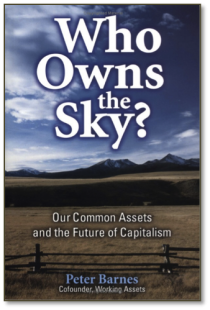Who Owns the Sky?

From the Introduction
THIS BOOK IS about your inheritance, my inheritance and our children’s inheritance. I’m not talking about the money our parents may or may not have given us. If you were lucky enough to have been born to rich parents, then you started life with a big advantage. That’s your individual inheritance, and if you got one you should be grateful for it, because in truth, you did nothing to earn it.
The inheritance I’m talking about is much larger, and at the same time, less obvious. It’s our inheritance of gifts we don’t normally think we own. Things like air, water and forests. These gifts are very valuable, perhaps even priceless. They’re valuable for basic biological reasons—we can’t live without them—and they’re also valuable in an economic sense…
How much is our shared inheritance worth? While it’s impossible to come up with an exact price tag, it’s safe to say it’s worth trillions of dollars. And even though we’re physically destroying much of this wealth, its economic value—which derives in large part from its scarcity—is actually rising. Think about it: the more we pollute our free-flowing water, the more we pay for bottled clean water.
Well, you may ask, what good does this wealth do us if we never see it in cash? One answer is: this wealth is the basis for all we hold dear, including life itself. Even if we never see a penny in cash, we must preserve and protect it for creatures yet unborn.
But that’s not my point in this book. My point, without belittling the previous one, is that we can and should turn some of our shared inheritance into cash. This can be done by (1) charging market prices for using our inherited assets, and (2) paying dividends to ourselves as their rightful inheritors. We should do this not out of greed, but out of concern for protecting these assets and passing them on, undiminished, to future generations.
 Free distribution with attribution
Free distribution with attribution